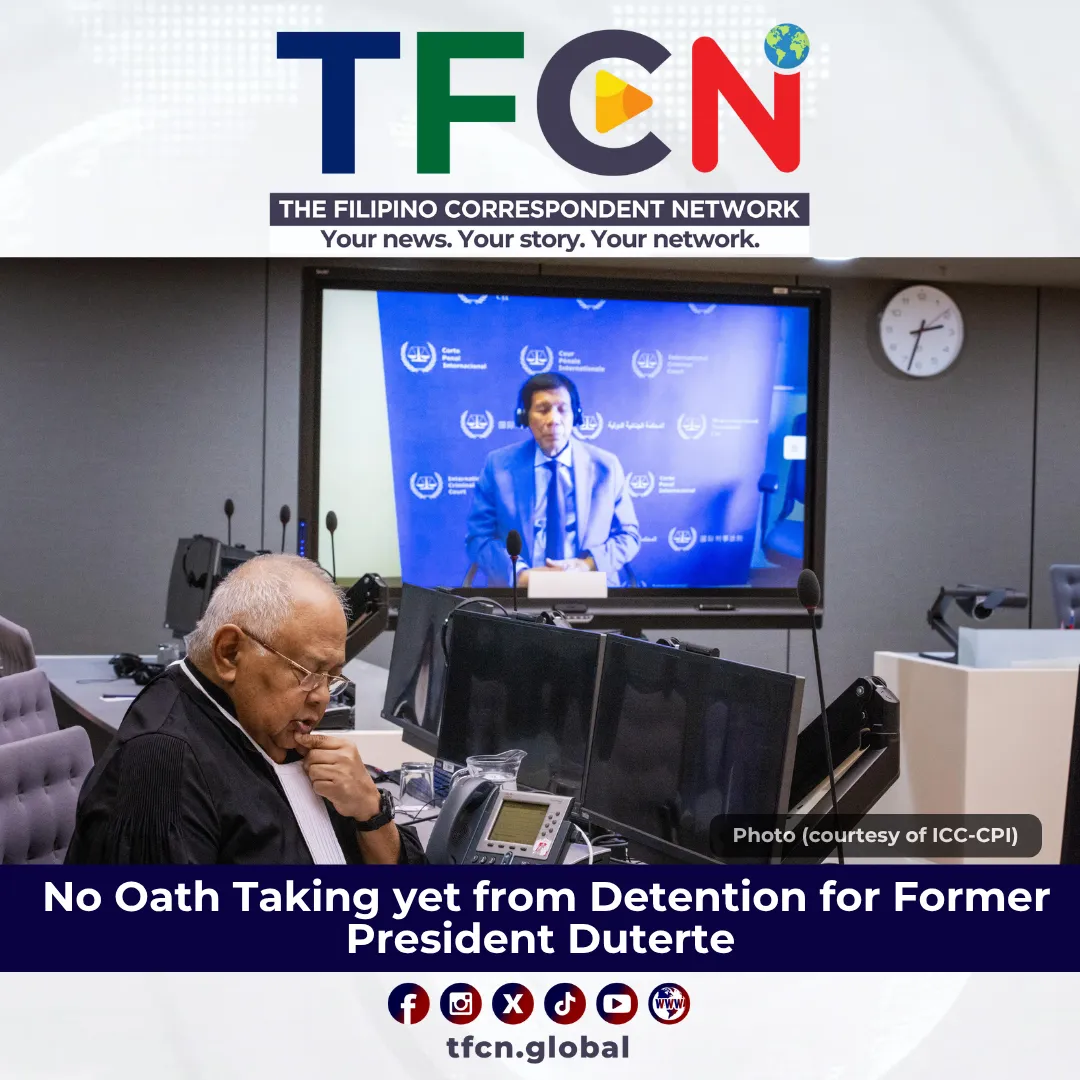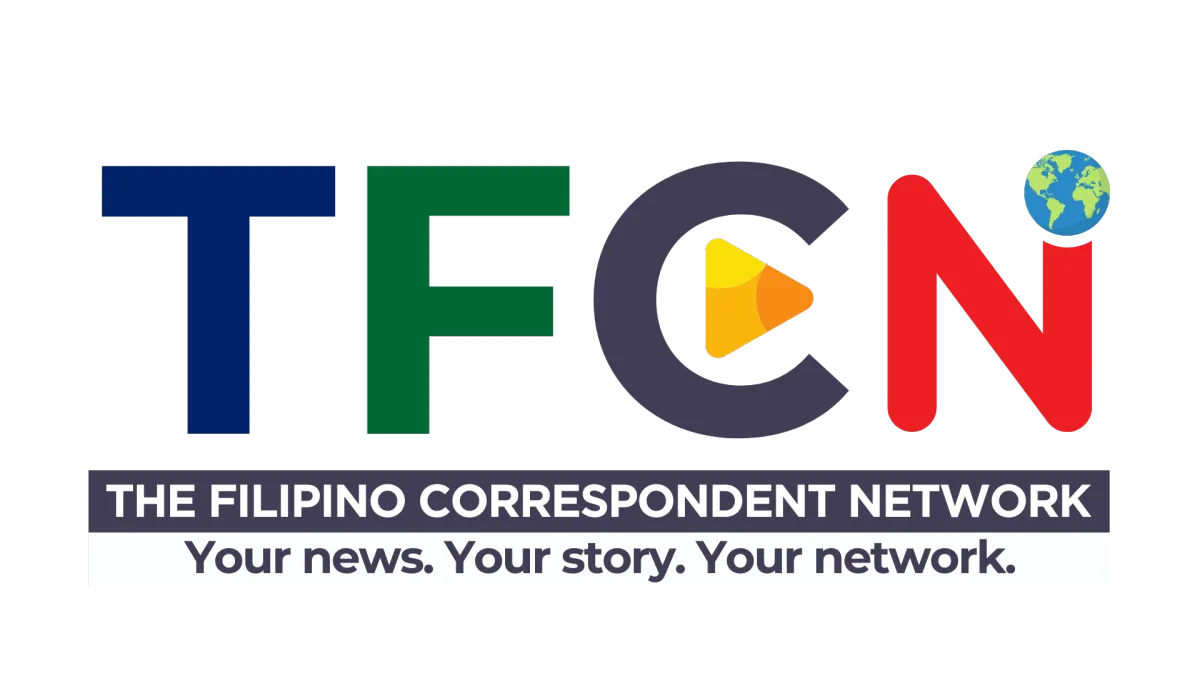
No oath taking yet from detention for former president Duterte?
THE HAGUE, THE NETHERLANDS — Today, June 30, former Philippine president Duterte’s supporters who usually gather across the International Criminal Court (ICC) detention center, under a tree next to a bike path, were very few, compared to the previous months. The beginning of the summer in the Netherlands is extra warm, reminiscent of the Philippines’ summer. Many Filipinos here, like the Dutch, enjoy spending time at the beach, having picnics in parks or now busy planning their summer vacation elsewhere. Perhaps that explains the number of the crowd.
There is no word yet when or if ever the newest detainee at the ICC detention center will start his work from the Hague as mayor of his bailiwick Davao city as the Barong-and-Filipiniana clad winning candidates in the Philippines take their oath to signal assumption of office at noontime of June 30.
The former president won the city’s top post while being detained since March 12 at the ICC detention center inside Scheveningen Prison for charges of crimes against humanity relating to his war against drugs campaign while he was mayor of Davao and president of the Philippines.
Duterte’s daughter, Vice-President Sara Duterte, during her last visit to the Netherlands in May, told the media that the defence lawyers are working on the possibilities of her father taking the oath of office before June 30.
“We discussed three possible ways for him to take the oath,” Sara said. “His ICC lawyer advised that once we receive the proclamation documents, we’ll revisit the discussion,” she said earlier.
The Philippine Embassy in The Hague last May said it awaits instructions from the Comelec, if and when authorized, on whether Duterte can take his oath. Typically, elected officials are sworn in before a Filipino judge, notary, or public official, though an embassy representative may perform the ceremony if authorized.
Davao mayor in the Hague?
Under election rules, Duterte has 6 months from proclamation to take the oath of office, after which the seat will be vacant, and the vice-mayor will assume the post, as a succession. The winning vice-mayor is Duterte’s son Sebastian, while the winning first councilor in one district is his grandson Rodrigo II or “Rigo.” Other family members in office are Duterte’s eldest, Davao City 1st District Representative Paolo, whose son Omar Vincent won as lawmaker of Davao City 2nd District. In case the patriarch won’t be able to take his oath, succession will just follow, making family members still on the top positions of the city.
Interim release request
On June 12, Duterte’s defence team filed an “Urgent Request for Interim Release” before the Pre-Trial Chamber 1. This after the petition to disqualify two chamber judges in ruling against the jurisdictional issue was denied.
In a 16-page request, lead defense counsel Nicholas Kaufman argued that the 80-year-old posed no risk of fleeing, wouldn’t disrupt the legal process if granted temporary release, and was unlikely to engage in further criminal activity. He also emphasized Duterte’s old age as a relevant factor.
With regard to the plea that “Duterte will not continue to commit crimes”, the request read: “The Prosecution referred to this possibility, in passing, only once in its Arrest Warrant Application. It predicated its position on a single newspaper article, by a single author, in respect of a single House Quad Committee hearing that took place in 2024, long after Mr Duterte had left office. The article allegedly attributed to Mr. Duterte a promise to double his drug war kills if re-elected mayor. Nothing else was cited nor any evidence provided.”
Kaufman further noted that a foreign government, though not identified (REDACTED in the document for public), had agreed in principle to host Duterte during his interim release. Additionally, he claimed that since the ICC Chief Prosecutor took a leave of absence, the Prosecution had indicated it did not oppose the request for release.
“The Government of [REDACTED] has expressed its willingness to receive Mr Duterte onto its territory and, accordingly, there is more than good reason to believe that Mr Duterte would not embarrass his hosts, and the hospitality afforded him, by violating the terms of his release,” the request indicated, adding that representatives of said government has “communicated its principled agreement to receive Mr Duterte onto its territory…”
Besides one unnamed country, there are other two unnamed countries in the request.
Contextually, all suspects are presumed innocent until proven guilty and under the Rome Statute, the judges may review the need for the continuation of the detention or at the request of the suspect. The judges of the pre-trial chamber will take the decision after verifying whether or not the conditions justifying the need for detention continue to be met or not.
Prosecutors’ opposition to interim release
In a reply, the ICC Office of the Prosecutor (OTP) formally objected to the request of Duterte for interim release, citing serious concerns over flight risk and noncompliance.
In a filing dated June 23, the OTP urged the Court to deny Duterte’s request, asserting that his continued detention in The Hague remains vital to guarantee his presence at trial for alleged crimes against humanity.
Prosecutors argued that Duterte’s refusal to recognize the legitimacy of the Court’s proceedings, along with his political influence, international ties, and financial means, could increase the likelihood of him evading justice if released even temporarily.
The OTP has also emphasized the need to keep Duterte in custody, citing the potential risk of obstruction and witness intimidation if he is granted interim release.
In their submission, prosecutors pointed to Duterte’s alleged capability to interfere with the judicial process and influence witnesses, warning that his release could jeopardize the integrity of ongoing investigations.
They further underscored a documented pattern of interference, referencing past cases such as the alleged harassment of former senator Leila de Lima and whistleblower Edgar Matobato. Duterte’s public threats toward critics of his anti-drug campaign were also noted as part of this pattern.
The OTP also denied it agreed for the interim release. It clarified in its opposition that the agreement only pertained to one country.
“The Prosecution only agreed to the Conditions on the basis that they would be implemented in [REDACTED], which, [REDACTED], has a long history of cooperation with the Court, which would suggest the Conditions would be strictly enforced. Moreover, [REDACTED]. [REDACTED] does not have the same extensive history of cooperation with the Court.”
Opposition from Public Counsel for Victims
Meanwhile, on June 25, the Office of Public Counsel for Victims (OPCV), representing the interest of the victims also filed its opposition to the interim release request
The principal counsel representing victims has raised serious objections against the interim release, citing substantial concerns over the former president’s potential to flee and exert undue influence on the case.
According to the counsel, the defense notably failed to dispute the core allegations of crimes against humanity, reinforcing the belief that there remain strong legal grounds for the case to proceed under the Court’s jurisdiction.
The gravity and number of charges, the counsel argued, serve as ample incentive for Duterte to evade justice. The Prosecution has so far disclosed to the Defence 371 items that form part of the prosecution’s case in support of charges of crimes against humanity, including murder, allegedly committed between 2011 and 2019.
The counsel for victims also highlighted that Duterte has already been granted access to significant portions of the case evidence—posing potential risks to the safety of witnesses—and that his deep knowledge of the prosecution’s materials must be considered in weighing flight concerns.
Duterte’s continued political clout was also underscored. Recently re-elected as mayor of Davao City—where several alleged crimes took place—he reportedly maintains significant influence over past and present subordinates. The counsel further pointed to his family's entrenched political positions, including his daughter serving as Vice President and both sons holding local and national posts.
The confirmation of charges against Duterte is scheduled for September 23-26.
Photo (courtesy of ICC-CPI): Former Philippine president Rodrigo Duterte’s initial appearance before the ICC's Pre-Trial Chamber on March 14, 2025.

